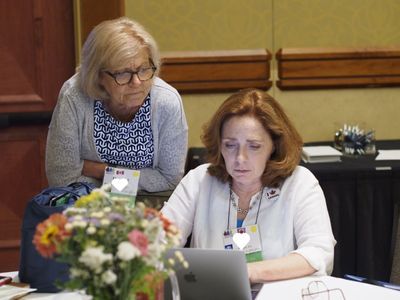Web Resources

Additional Resources/Websites
There is a wealth of information on the internet, and you and your family can better educate yourself about primary sclerosing cholagitis (PSC).The following list is a sampling of what is available online.
These entries represent primarily government or non-profit sites that our members have found useful in learning more about their disease or related issues. We cover medical/disease sites, and those that focus on other PSC-relevant topics: navigating medical systems, lab tests, financial assistance, pharmaceuticals, caregiving, transplant, and the National Institutes of Health’s medical encyclopedia and dictionary.
Use the internet wisely and carefully, as a guide to your individual situation. New research can change old understandings quickly, so check the date of the information on each web page; be sure the site’s sponsor is reputable. Chat rooms and message boards may not always impart accurate information, and well-meaning people may not advise what your medical professionals would advise. Commercial sites may present a conflict of interest, especially if they are selling a product. They may not provide impartial scientific information. When you find facts or data you do not understand or if it conflicts with what you’ve been told, talk to your medical team. Use the internet as a resource, but not as your only resource.
These sites are authoritative and useful, but the fact that a site is listed here does not connote an endorsement of its contents by PSC Partners Seeking a Cure. Always consult your physician for medical advice.
Medical Encyclopedia On-Line from the National Institutes of Health and the National Library of Medicine
MedLine Plus: The Medical Encyclopedia includes articles about diseases, tests, symptoms, injuries, and surgeries. It also contains an extensive library of medical photographs and illustrations.
Lab and Medical Tests Guides
National Institutes of Health Diagnostic Imaging Site: This site explains the imaging tests you might need, such as x-rays, CT scans, nuclear scans, and MRI scans.
National Institutes of Health Digestive Disease Diagnostic Testing Site: The National Institutes of Health offers a wealth of information, including various tests you might experience, such as endoscopy, scans, blood tests, etc.
Articles in Medical Journals
PubMed: You can search in the extensive National Institutes of Health library of national and international medical journals.
Medications
Medline: Medline is another federal government site. Here you can find information on medications, including their purpose, side effects, dosages and related information. The Food and Drug Administration drug sites are linked. There is information on research regarding the medication. Also available in Spanish (Español).
Liver and Gastrointestinal Diseases
Information on Liver and Digestive Diseases: Medline includes a page specific to liver diseases.
National Digestive Diseases Information Clearinghouse: The National Digestive Diseases Information Clearinghouse offers information on digestive diseases.
American Autoimmune and Related Diseases Association: The association offers a wide-ranging site devoted to managing and eliminating autoimmune diseases. On the site is a list of identified autoimmune diseases, some of which have been related to PSC. The site offers information on autoimmunity, support groups, a blog, and a subscription newsletter.
Cholangiocarcinoma Foundation: The group supports research, collaboration, understanding and education on the disease. There is information on the disease, support, and tips for the newly diagnosed. A discussion board and live chats are offered.
Hepatitis A Also in Spanish (Español)
Hepatitis B Also in Spanish (Español)
Hepatitis C Also in Spanish (Español)
Primary Sclerosing Cholangitis
American Liver Foundation: The foundation promotes liver health and disease prevention. It focuses on research, education, and advocacy. You can sign up for an email newsletter to keep abreast of liver funding and research news.
Crohn’s and Colitis Foundation of America: This non-profit organization wants to find the cures for these two diseases. It provides education and support programs as well as funding for research. On the website there is a wealth of information on Crohn’s and colitis especially for those newly diagnosed.
Financial Issues
Medicine Assistance Tool: The site is sponsored by pharmaceutical companies and assists low-income, uninsured, or underinsured patients to prescription assistance programs, many of which provide medicines for free or nearly free.
Help Hope Live: This organization helps raise money in communities to cover uninsured medical expenses related to transplantation and catastrophic injury.
Medicare: There are links to Medicare Prescription Drug Plans, billing, appeals, long-term care, and specific information about plan choices. Search tools allow comparison of prescription drug plans, of hospitals in your area, nursing homes in your area, and to health plans and Medigap Policies in your area.
Medicaid: Medicaid is a state program for certain low-income individuals. There are links for information about specific contacts for help and support in the application process.
RxAssist: Offers search assistance to identify Patient Assistance Programs run by pharmaceutical manufacturers.
Transplant Living Financial Resource Directory: The site is part of the UNOS site and should not be interpreted as a comprehensive list or an endorsement. The list does offer websites, addresses, and phone numbers from many important organizations (American Liver Foundation, American Society of Transplant Surgeons, and National Minority Organ and Tissue Transplant Education Program-MOTTEP).
Caregiver and Family Support
Caringbridge: Another site create-you-own-website popular with PSC-ers, which now is available in Spanish. New features recently have been added, including features for the visually impaired, easier creation assistance, and privacy improvements.
Well Spouse Association: This non-profit organization, more than twenty years old, offers a site for well spouses to connect with others and to find tips to manage their role. A support group is available on line as well as in some localities. There is an annual conference and the group puts out useful publications; a newsletter (subscription) is also available.
Lottsa Helping Hands: As a web-based community the group aims to assist in organizing friends, family and others to support individuals or families during a health or other crisis. The site can manage volunteers, offer support, coordinate activities, such as meals, transportation, specific tasks.
National Alliance for Caregiving: The Alliance is a coalition of groups that support caregiving research and policy development. The group offers conferences and materials for caregivers, including excellent information about coping.
Today’s Caregiver Magazine: The magazine is a subscription publication, yet many of the useful articles are archived on this site. The site has links to other helpful sites, and offers a free e-newsletter for caregivers.
Family Caregiver Alliance: The group is a public voice of caregivers. You can view programs of information, education, services, and research. The site is a link to support groups, advice and information, and offers a newsletter with useful updates (centers, conferences, teleconferences).
Caregiver Action Network: This organization speaks up for more than 50 million Americans who care for a chronically ill, aged, or disabled loved one. The group addresses the common needs and concerns of all family caregivers.
Transplant Sites
The United Network for Organ Sharing (UNOS): The UNOS organization develops policy, issues regulations, and oversees the allocation of organs for transplant in the United States. UNOS maintains waiting lists for transplant candidates, as well as statistics on organ donation and transplantation. Also included on the site is information on managing a transplant, before and after surgery. There are several pages on the site that relate to specific liver allocation policies, which are under continuing review from a national perspective.
MELD Calculator Online: If you are waiting for a transplant you will become familiar with the MELD system of scoring your liver disease. You can calculate your own MELD score at this page. You can calculate a PELD score at this link.
Chris Klug Foundation: Chris Klug is a liver recipient, Olympic snowboard bronze medal winner, and a member of the PSC Partners board. His foundation supports organ donation nationwide via “Donor Dudes” (and “Dudettes”). Aimed at educating persons in high school and college about organ donation, the group has outreach to campuses and holds events in various locations that improve public awareness of donation.
Association of Organ Procurement Organizations: This is the site of the professional organization for organ procurement. Policies and issues within this community are included. This national site offers links to the OPOs that serve your region.
Donate Life America: Founded in 1992, the group educates the public about organ and tissue donation. The site includes sections in Spanish and has a focus on minority organ donation/transplant. It also includes a link to each state’s organ donation information; for some states you can sign up on a state donor registry. The group promotes education on donation and encourages volunteers who want to become active in this area.
Transplant Chronicles: Although this is a project of the National Kidney Foundation, the online newsletter offers a wealth of information for all transplant patients. Archived copies are available, and you can enter a subscription to the information via email. The newsletter covers tips on managing pre- and post-surgery, patient stories, policy and research information, and related topics.
Transplant Living: This UNOS site has useful information on transplant and links to other sites within UNOS that can inform patients both before and after surgery. Readers can sign up for a free email newsletter.
Transweb: This University of Michigan website promotes awareness and activities related to public information about transplant.
Organ Procurement and Transplantation Network Sites: The OPTN maintains the national patient waiting list and features comprehensive transplant data. The calendar lists OPTN/UNOS events. The quick links lead to data, resources, newsroom, and a member directory.
OPTN Datasource: This reference takes you to the organ datasource for liver. It lists the functions of the liver, liver transplant procedures, and reasons for transplantation.
Scientific Registry of Transplant Recipients: SRTR supports evaluation of scientific and clinical status of solid organ transplantation in the United States. You can research national transplant statistics, program-specific reports for individual hospitals, and research resources.
Travel Emergency Flight Services
MedjetAssist: This site is representative of several firms that offer medical evacuation services to travelers. Some PSC Partners members have used this particular company, but we urge members to check out similar companies to assess their services, costs, etc.
Angel Flight: Pilots who volunteer to fly patients for legitimate medical need started the group. Using donated planes, and with donations from individuals, clubs, and corporations, the service is free.
Medical ID Medallions and Support
Medic Alert Foundation: The foundation offers medallions and jewelry that include a toll free number service that can be accessed in an emergency, when you may be unable to talk. There is a fee annually.
American Medical ID: This commercial site is typical of many that offer medical identification jewelry. There is no medical database service to call in an emergency, but you can have engraved on the medallions any contact information you wish. No annual fee. Note: retail jewelry stores also have catalogs of medical medallions to purchase and you can buy these locally, saving time and interacting with the store personnel face to face.
Complete your profile and join PSC Partners Seeking a Cure in advancing PSC research towards a cure. Find information about clinical trials.





